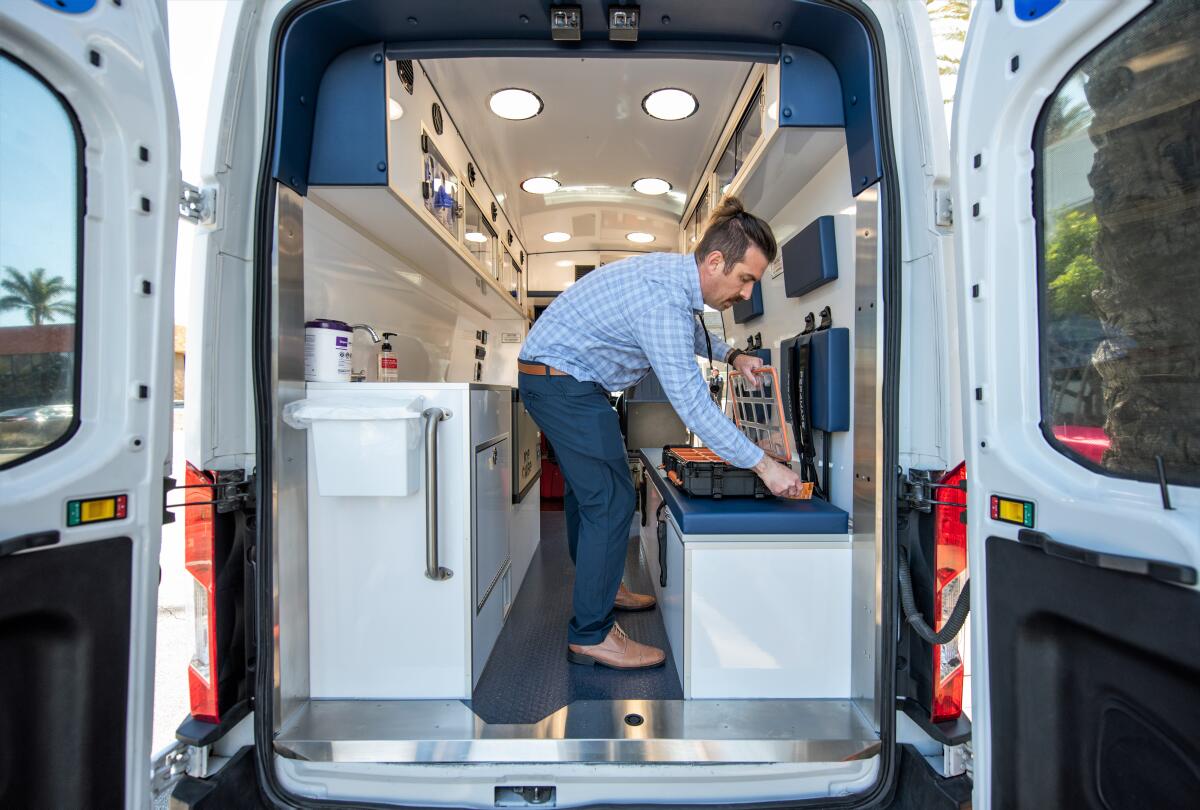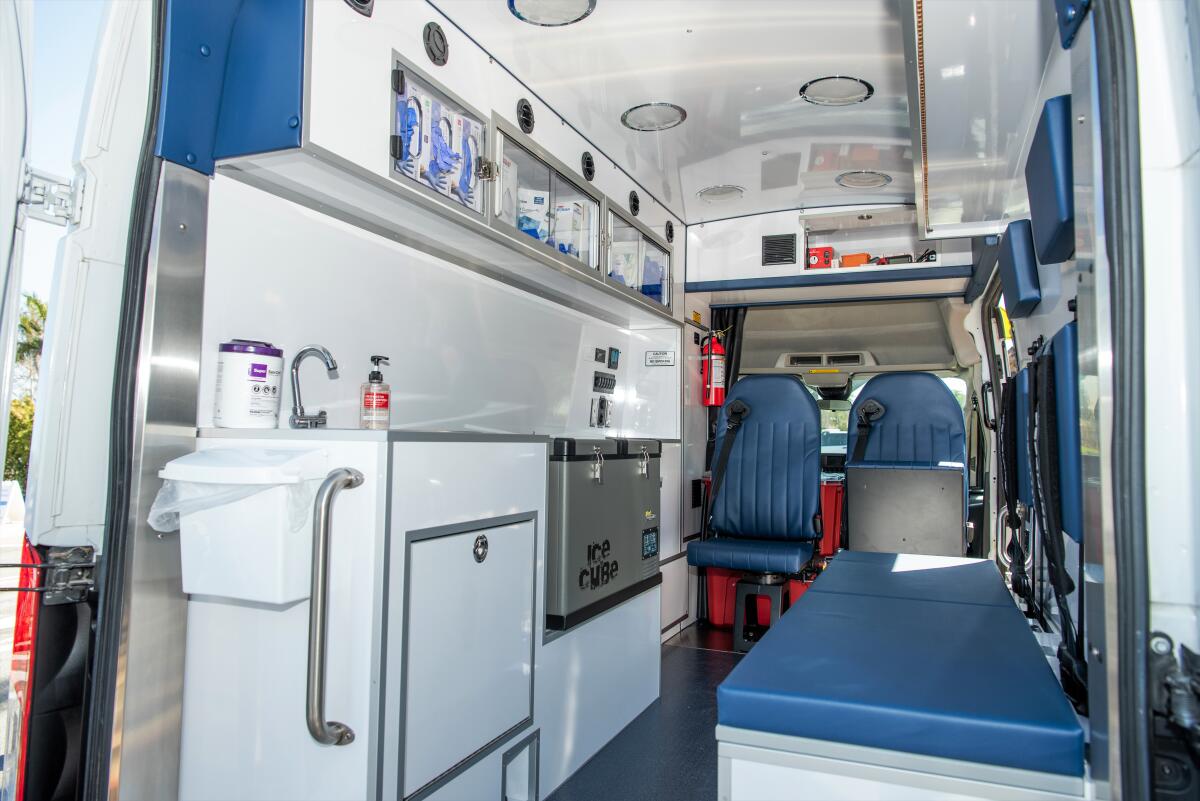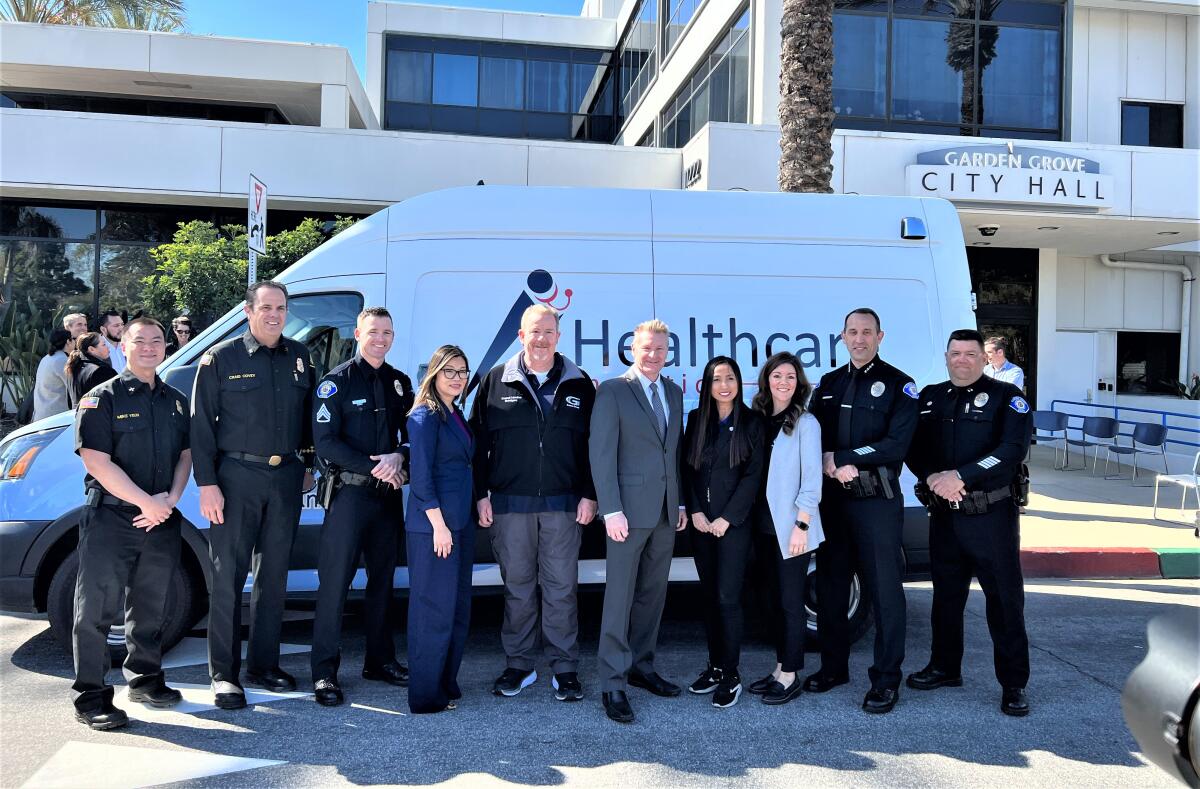Taking it to the streets: Costa Mesa to offer mobile health to homeless with CalOptima

Although most unhoused individuals are eligible to receive medical and behavioral health services, they are often the least likely to schedule a doctor’s appointment or step foot into a care center for the treatment they need.
That’s why, in Orange County, CalOptima Health, a county organized health system for low-income residents, is bringing healthcare to them.
A new Street Medicine program aims to reach individuals living on the streets and in shelters with a fully equipped doctor’s office on wheels that cannot only provide basic care but can get them plugged into wider comprehensive healthcare and housing systems.
More than just a van, the program employs a team of health experts who work with a partner city to determine a municipality’s specific needs and coordinate with law enforcement, outreach teams, shelters and housing providers to meet those needs.

“We know [unhoused individuals] do not trust the traditional medical system. They do not like to go to brick-and-mortar facilities,” said Kelly Bruno-Nelson, executive director of Medi-Cal and CAL for CalOptima. “This is an effort to recognize that, if we want to help our members, we need to meet them where they’re at.
“It’s not reactive, it’s proactive, and that’s what these folks ultimately need.”
Started in April as a pilot program in Garden Grove, CalOptima Health’s Street Medicine program has already served over 100 people and is now expanding to create similar, tailored programs in other cities — including Costa Mesa.
Last month, CalOptima’s board of directors announced the agency would partner with Costa Mesa, as well as Anaheim, to build two separate customized street medicine programs to reach out to individuals living on the streets or in congregate housing shelters.

While the agency is fronting the start-up funds, the idea is that as eligible recipients are enrolled in Medi-Cal, their care will be reimbursed by the state, creating a self-sustaining delivery model.
Nate Robbins — who coordinates and oversees Costa Mesa’s homeless services as the city’s neighborhood improvement manager — said his team is working alongside CalOptima in an RFP process to select a vendor to provide services and operate the mobile van.
“The intention is to have it be a one-stop shop, where the van is that initial contact,” Robbins said Thursday. “The relationship can be built and [clients] can be referred out to specialists, or maybe the vendor has that in house.”
The program’s outreach effort begins with peer navigators, who themselves have experienced homelessness and are a first point of contact with potential members. They will help bring people into the mobile health center.
Once there, members can arrange regular appointments through the mobile van and be referred to physical and mental health specialists. They may also be enrolled into programs offering broader social support and help with temporary and, ultimately, permanent living accommodations.

Bruno-Nelson said that although the Street Medicine program focuses on health, housing is another chief aim.
“It is absolutely impossible to be healthy on the street. Consequently, if we’re not also focusing on housing, we’re missing the ultimate goal,” she said. “We’re really taking care of their medical needs and their housing needs collectively.”
To that end, in Garden Grove, which does not currently have a bridge shelter, CalOptima officials purchased a defunct motel and are in the process of transforming the site into a support center that will provide temporary accommodations for Street Medicine program recipients. It is estimated to be up and running by 2025.
Costa Mesa’s Street Medicine program, anticipated to hit the ground running in July, will be different as the city already operates a shelter, in conjunction with Newport Beach, that can house up to 85 adults.
The capacity of the facility will grow to 100 beds this spring, after Costa Mesa received $718,000 in state funding, allocated by the county, to be able to offer behavioral beds and outreach staff for individuals with mental health and substance abuse issues.
Taking advantage of a state law allowing court-mandated mental health treatment, the county will pay Costa Mesa $718,000 for 15 beds for people with mental health and substance abuse issues and the services they’ll need.
“Everything is lining up perfectly, exactly as it should be,” Robbins said of the timing of the complementary programs.
Costa Mesa Mayor John Stephens agreed, applauding CalOptima Health’s efforts to increase access to medical care among the city’s most vulnerable population.
“The city of Costa Mesa is grateful to have been selected as one of three Orange County cities to implement the Street Medicine program,” he said. “We look forward to partnering with CalOptima to provide medical care for those in extreme need.”
Robbins said he and his colleagues are eager to begin crafting a service model that will work with and build upon what the city is already doing to reduce homelessness in Costa Mesa.
“This really is a game changer,” he said.
All the latest on Orange County from Orange County.
Get our free TimesOC newsletter.
You may occasionally receive promotional content from the Daily Pilot.





